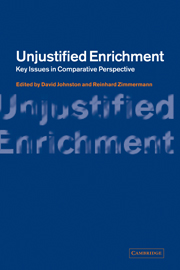Book contents
- Frontmatter
- Contents
- List of contributors
- Preface
- Table of cases
- List of abbreviations
- I Introduction
- II Enrichment ‘without legal ground’ or unjust factor approach
- III Failure of consideration
- IV Duress and fraud
- V Change of position
- 8 Restitution without enrichment? Change of position and Wegfall der Bereicherung
- 9 Unwinding mutual contracts: restitutio in integrum v. the defence of change of position
- VI Illegality
- VII Encroachment and restitution for wrongs
- VIII Improvements
- IX Discharge of another person's debt
- X Third-party enrichment
- XI Proprietary issues
- XII Taxonomy
- Index
9 - Unwinding mutual contracts: restitutio in integrum v. the defence of change of position
Published online by Cambridge University Press: 31 July 2009
- Frontmatter
- Contents
- List of contributors
- Preface
- Table of cases
- List of abbreviations
- I Introduction
- II Enrichment ‘without legal ground’ or unjust factor approach
- III Failure of consideration
- IV Duress and fraud
- V Change of position
- 8 Restitution without enrichment? Change of position and Wegfall der Bereicherung
- 9 Unwinding mutual contracts: restitutio in integrum v. the defence of change of position
- VI Illegality
- VII Encroachment and restitution for wrongs
- VIII Improvements
- IX Discharge of another person's debt
- X Third-party enrichment
- XI Proprietary issues
- XII Taxonomy
- Index
Summary
This contribution addresses the question how the defence of change of position can apply when a mutual contract is unwound. The following hypothetical case, illustrated in Figure 9.1, should make the problem clear. A and B have agreed to swap A's cow for B's horse. Both have fully performed their respective obligations. A has transferred his cow to B and B has transferred his horse to A. Then the horse ceases to exist. Neither A nor B were at fault. The horse was lost due to some supervening event. They now find out that there is some reason why the contract could be unwound: A was mistaken when he entered into the contract, fraudulently induced or forced by B to enter into the contract, the horse was defective, B did not have title to the horse, A was a minor, or the contract was simply void. In all these cases A may have a right to claim back the cow from B and B may claim back the horse from A. But how does it affect A's claim for the cow that B has already given the horse to A and that A is not able to give it back? How does it affect B's claim that the horse has ceased to exist? Is the defence of change of position the proper legal tool to help to solve these questions? The defence could come into play at two different points of analysis.
- Type
- Chapter
- Information
- Unjustified EnrichmentKey Issues in Comparative Perspective, pp. 243 - 286Publisher: Cambridge University PressPrint publication year: 2002
- 1
- Cited by

